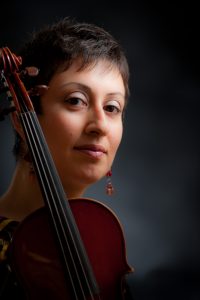The “New World Symphony” is one of the most cherished orchestral works in the world. Though based on American culture, it was written by an immigrant — Czech composer Antonín Dvořák, who proved sometimes it takes an outsider to expose what is most profound about another’s customs.

Dvořák wasn’t the only one to pull from the world around him. Heitor Villa-Lobos, a Brazilian nationalist, would follow Dvořák’s lead with his music influenced by the Latin culture of his home country. William Grant Still, a Black composer from Mississippi, blended spirituals and gospel into his symphonic works. The list goes on.
Using compositions new and old, musicians tell the stories of diverse communities through their instruments, but for this week’s Into the Music, the Chautauqua Symphony Orchestra is looking inward, as instrumentalists plan to set their music aside to tell their own stories in hopes of diversifying the future of their craft.
Sphinx Organization President and Artistic Director Afa S. Dworkin will host “Sharing IDEAs: A conversation on inclusion, diversity, equity and accessibility” with the 2020 Chautauqua Symphony Orchestra Diversity Fellows and Chautauqua and Cincinnati Symphony Orchestras’ Principal Bassist Owen Lee at 8:15 p.m. Tuesday, July 21, on the CHQ Assembly Virtual Porch.
Dworkin will interview the panel of musicians with the goal of hearing their perspectives and giving the opportunity to voice ideas on how Chautauqua can experience and drive change in terms of IDEA — inclusion, diversity, equity and accessibility. IDEA is one of the 150 Forward strategic plan’s four cross-cutting imperatives aimed to “create the conditions in which everyone feels that they can engage as full and valued participants in the Chautauqua experience,” as stated in the plan adopted last spring.
Dworkin said Sphinx’s mission statement is to transform “lives through the power of diversity in the arts.”
“We consider ourselves a social justice institution that works to achieve its mission through work in performing arts, primarily classical music,” she said. “In that, our primary goal is to address the lack of equity and representation of Latinx and Black artists in classical music.”
At the forefront of Tuesday’s discussion, according to Dworkin, will be the perspectives of young musicians of color as they are the “future of what we know and love.”
“This Chautauqua conversation is all about sitting down and listening to the personal experiences of our musicians from their own perspective seats of how vital diversity and representation are to their own career paths and therefore, their lives as a whole,” Dworkin said.
Funded by The Andrew W. Mellon Foundation, the College-Conservatory of Music and Cincinnati Symphony Orchestra Diversity Fellowship is a performance fellowship program for string players. The program provides funding for two years’ worth of learning experience for graduate-level violin, viola, violoncello and double bass players coming from populations that are historically underrepresented in classical music. Additionally, as many as five diversity fellows are selected annually to participate in a summer residency with the Chautauqua Symphony Orchestra.
One of the 2020 fellows is violinist Jordan Curry.
“Recent events have brought to light a systemic lack of diversity and inclusion in the world, which, of course, includes fine arts,” Curry said. “This is a chance to get feedback from people of color who are affected by those systemic issues. I think that’s the solution to the problems we are facing — honest conversation.”
This conversation, however, is only one step of “too many to count,” Curry said.
“I don’t want us to just talk about our plans of how to fix the problem in front of us, I want to see execution of these plans and feedback received from those steps,” he said. “I think this needs to be a constant cycle with the community because, at the end of the day, we serve them.”
Until now, Curry said he has never been given the opportunity to engage in transformative dialogue and said he sees it as a chance to be an industry leader instead of solely a performer.
“It’s a chance for me to pull from the experiences I have had and see what good I can do with them,” he said. “There aren’t a lot of positives to what we face every day, but driving change is always a good place to start.”
Other diversity fellows on the panel will include violinist Yan Izquierdo, violist Edna Pierce, cellist Maximilliano Oppeltz-Carroz and bassist Amy Nickler. Dworkin believes these five musicians will “lead us to a more just and equitable society,” but in order to see that vision to fruition, she said the audience must follow their lead.
“We will discuss things all of us, from our various walks of life, can do to push progress forward and change the way we’ve always done the normal so our normal can evolve,” Dworkin said. “… We can’t be excellent unless we are diverse. I think we will uncover something rich that has been missing all along.”
Ongoing IDEA work at Chautauqua Institution is made possible by the Greater Washington Community Foundation, Janet Holton and Philip I. Haber, Sarah and Karen James, and Sheila Penrose and Ernie Mahaffey.




